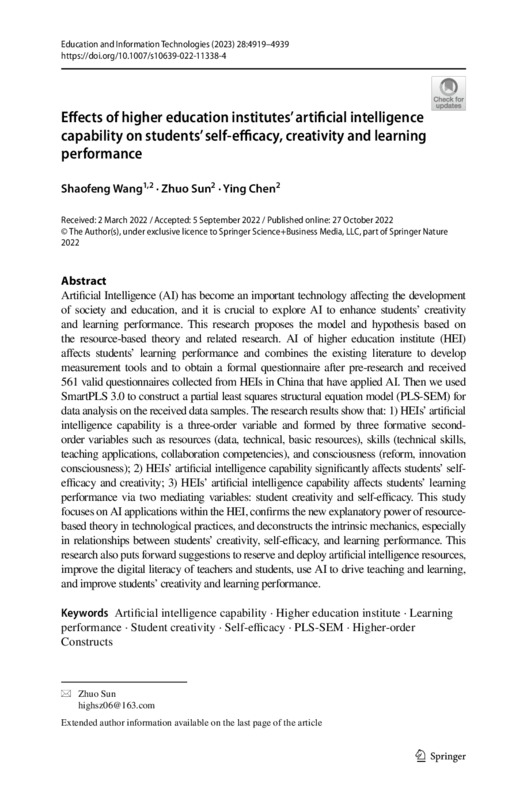Effects of higher education institutes’ artificial intelligence
capability on students’ self‑efficacy, creativity and learning
performance
Item
-
Title
-
Effects of higher education institutes’ artificial intelligence
capability on students’ self‑efficacy, creativity and learning
performance
-
Abstract
-
Artificial Intelligence (AI) has become an important technology affecting the development of society and education, and it is crucial to explore AI to enhance students’ creativity and learning performance. This research proposes the model and hypothesis based on the resource-based theory and related research. AI of higher education institute (HEI) affects students’ learning performance and combines the existing literature to develop measurement tools and to obtain a formal questionnaire after pre-research and received 561 valid questionnaires collected from HEIs in China that have applied AI. Then we used SmartPLS 3.0 to construct a partial least squares structural equation model (PLS-SEM) for data analysis on the received data samples. The research results show that: 1) HEIs’ artificial intelligence capability is a three-order variable and formed by three formative second- order variables such as resources (data, technical, basic resources), skills (technical skills, teaching applications, collaboration competencies), and consciousness (reform, innovation consciousness); 2) HEIs’ artificial intelligence capability significantly affects students’ self-efficacy and creativity; 3) HEIs’ artificial intelligence capability affects students’ learning performance via two mediating variables: student creativity and self-efficacy. This study focuses on AI applications within the HEI, confirms the new explanatory power of resource-based theory in technological practices, and deconstructs the intrinsic mechanics, especially in relationships between students’ creativity, self-efficacy, and learning performance. This research also puts forward suggestions to reserve and deploy artificial intelligence resources, improve the digital literacy of teachers and students, use AI to drive teaching and learning, and improve students’ creativity and learning performance.
-
Creator
-
Shaofeng Wang
-
Contributor
-
Zhuo Sun
-
Ying Chen
-
Date Submitted
-
March 2, 2022
-
Date Accepted
-
September 5, 2022
-
Date Available
-
October 27, 2022
-
Extent
-
22 pages
-
Format
-
PDF
-
Identifier
-
ISSN: 1360-2357
-
EISSN: 1573-7608
-
DOI: 10.1007/s10639-022-11338-4
-
Is Part Of
-
Education and information technologies, 2023-05, Vol.28 (5), p.4919-4939
-
Language
-
English
-
Publisher
-
New York: Springer US
-
Source
-
Academic OneFile: Gale
-
Type
-
Text
-
Subject
-
Artificial intelligence
-
Computational intelligence
-
Educational technology
-
Instructional systems--design
-
Computer science
-
Computers and literacy
-
Digital literacy
-
Quantitative research
-
Education, higher
-
Student learning communities
-
Self-efficacy
-
Creativity

